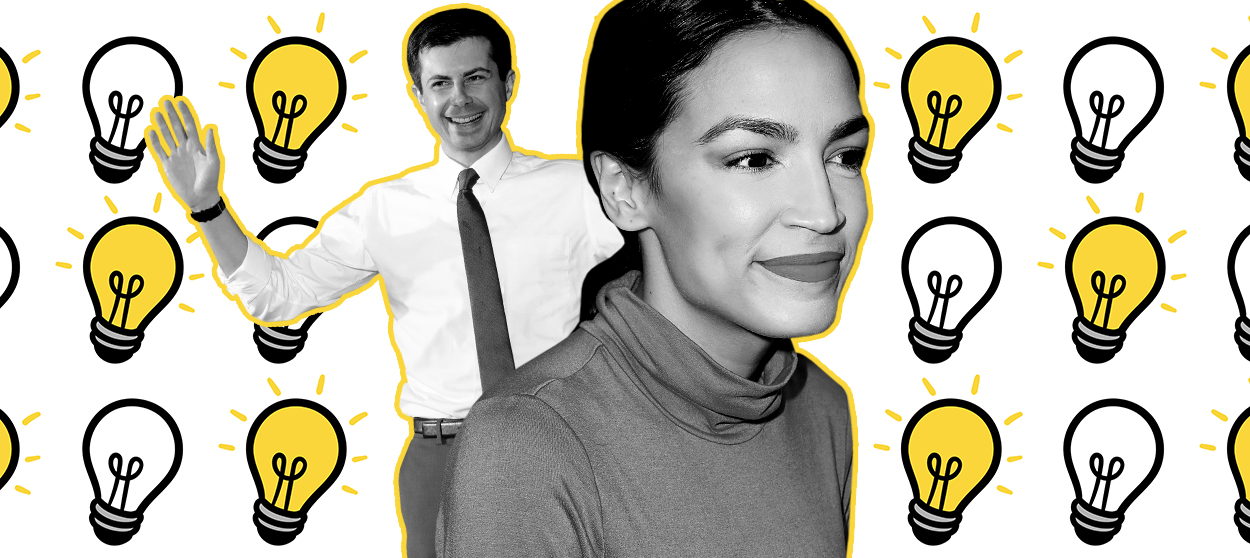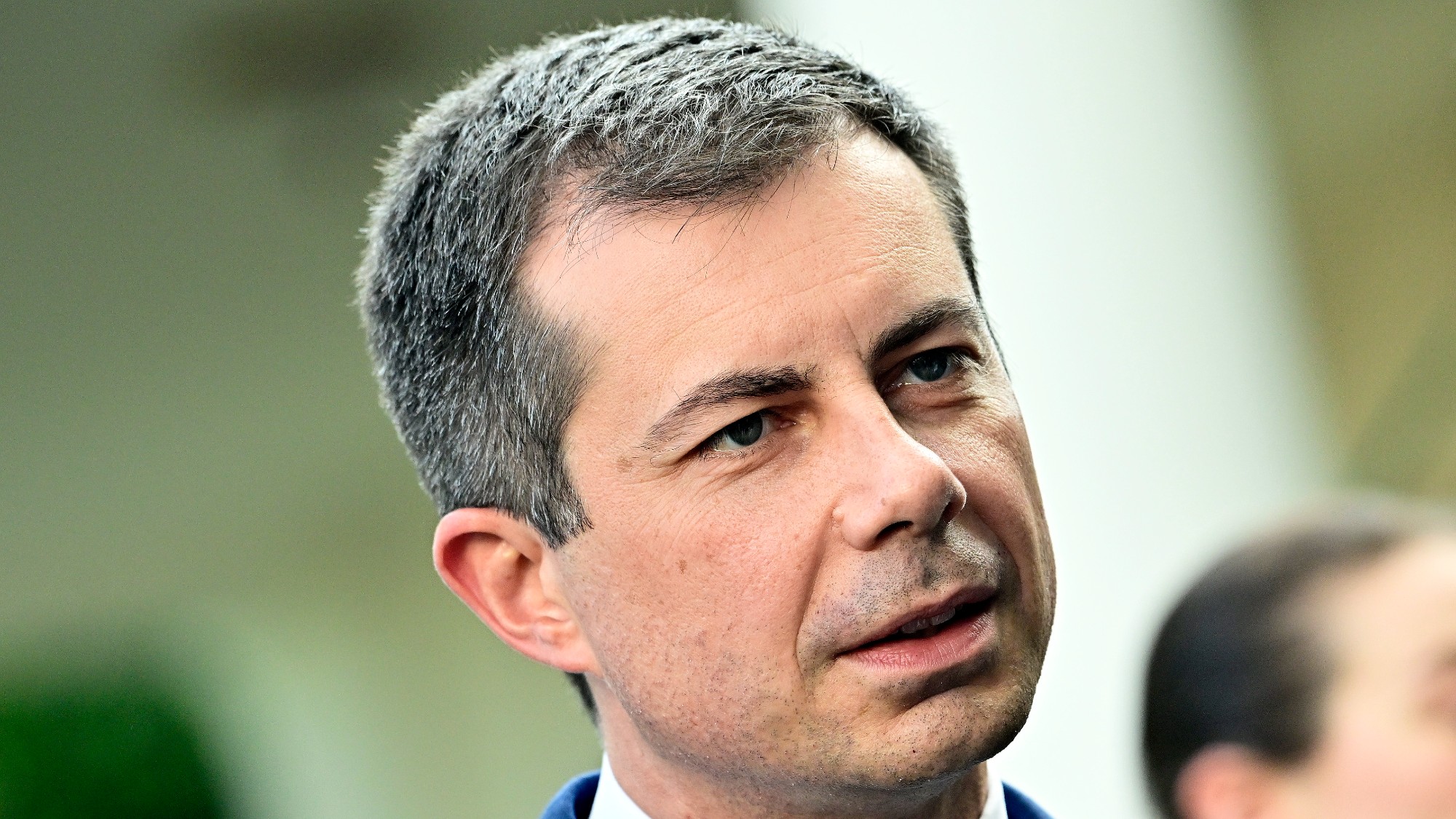Alexandria Ocasio-Cortez and Pete Buttigieg are young. But that's not what we should judge them on.
Our political hypocrisy about youth


A free daily email with the biggest news stories of the day – and the best features from TheWeek.com
You are now subscribed
Your newsletter sign-up was successful
Children are generally not smart about politics.
That's not a slight on children, nor is it a suggestion that politics is a uniquely complex subject. It's not even to say that kids can't be right about politics — so long as we remember right and smart are not the same thing.
Unfortunately, we rarely do remember, as there is something about combining youth and politics which divests us of our common sense. We treat youth like a concentrating factor: It makes right statements better and wrong ones worse. When the children say something we like, they're precocious and important, and we jaded adults must heed the beautiful wisdom of youth. (This is how sincere iterations of "woke toddler" happen.) And when they offer views we oppose, they're just dumb kids who shouldn't be taken seriously. (This is how we get cruel brush-offs of teenage shooting survivors.)
The Week
Escape your echo chamber. Get the facts behind the news, plus analysis from multiple perspectives.

Sign up for The Week's Free Newsletters
From our morning news briefing to a weekly Good News Newsletter, get the best of The Week delivered directly to your inbox.
From our morning news briefing to a weekly Good News Newsletter, get the best of The Week delivered directly to your inbox.
That changeable fixation on youth sprouts up on right and left alike. A decade ago, many conservatives swooned for Jonathan Krohn, a besuited wunderkind who spoke at CPAC and landed a book deal at the tender age of 13. By 17, the author of Defining Conservatism was no longer a conservative. His early punditry was "naive," Krohn told Politico. "It's a 13-year-old kid saying stuff that he had heard for a long time. ... I live in Georgia. We're inundated with conservative talk in Georgia."
Indeed. And this would be obvious to all of us in any other context: A 13-year-old offering "their" ideas is mostly parroting what they've heard from adults they love and respect. This is not a bad thing! Imitative learning is an important part of childhood development; it helps us learn to speak, and it can help us learn to think, too — including about politics. But a child's ability to compellingly echo political perspectives is no indicator of those perspectives' value. Policy does not gain or lose merit because it comes from the mouth of babes.
Nor is it magically made simple by the fervor of youth. This spring has seen the fête of Greta Thunberg, a 16-year-old Swedish girl whose environmental activism netted her a nomination for the Nobel Peace Prize. Thunberg is admirably determined and passionate — but she is also very much 16, declaring at Davos in January that it is "a lie" to say "nothing is black and white" and that the proper response to climate change is daily "panic" and "fear."
Thunberg may well maintain her present policy recommendations into adulthood, but her arguments will hopefully evolve. As we'd easily recognize where less inflammatory topics are concerned, older teenagers are capable of critical and original thinking, but they have limited life experience and tend to approach complicated topics with insufficient nuance.
A free daily email with the biggest news stories of the day – and the best features from TheWeek.com
When you're 16 or 18, it's easy to get excited about big ideas. It's rather more difficult to understand why rational, well-intentioned people might disagree with what strikes you as obviously, necessarily correct. Empathy requires practice, as does a fair weighing of competing practical considerations. We’re apt to forget it once an earnest teenager starts giving winning voice to views we share, but none of this changes when the context is political.
Yet perhaps even more troublesome than how we handle actual youth in politics is the way we expand this category well beyond its normal limits.
South Bend, Indiana, Mayor Pete Buttigieg, the newest official entrant to the Democratic primary race, will almost certainly be decried by some for his youth, as his 37 years are young by presidential standards. Or witness the treatment accorded by her critics to Rep. Alexandria Ocasio-Cortez (D-N.Y.), aged 29. "The Green New Deal, done by a young bartender, 29 years old," President Trump recently sneered at her signature policy proposal. "A young bartender, wonderful young woman."
Ocasio-Cortez is young by the graying standards of Capitol Hill, sure, but she's hardly a child. She's older than at least three signers of the Declaration of Independence, and barely younger than Thomas Jefferson was — 33 — when he wrote it. Adulthood may arrive a bit later now than in 1776, but in every situation outside politics, a 29-year-old is an adult and is treated as such in all respects.
The same should be true inside the beltway. Ocasio-Cortez's age may be relevant to her electability or representation of her district (the median age in the Bronx is 31). It might give us insight into why she thinks as she does or help explain her public appeal. But it should have no bearing on our evaluation of her ideas.
A 29-year-old member of Congress (or a 37-year-old presidential candidate) deserves no special dismissal or praise, scrutiny or leeway for their age. I don't expect Trump to recognize this, but surely the rest of us can do better. In politics as in any other realm, we can learn to treat children as children and adults as adults.
Bonnie Kristian was a deputy editor and acting editor-in-chief of TheWeek.com. She is a columnist at Christianity Today and author of Untrustworthy: The Knowledge Crisis Breaking Our Brains, Polluting Our Politics, and Corrupting Christian Community (forthcoming 2022) and A Flexible Faith: Rethinking What It Means to Follow Jesus Today (2018). Her writing has also appeared at Time Magazine, CNN, USA Today, Newsweek, the Los Angeles Times, and The American Conservative, among other outlets.
-
 Crisis in Cuba: a ‘golden opportunity’ for Washington?
Crisis in Cuba: a ‘golden opportunity’ for Washington?Talking Point The Trump administration is applying the pressure, and with Latin America swinging to the right, Havana is becoming more ‘politically isolated’
-
 5 thoroughly redacted cartoons about Pam Bondi protecting predators
5 thoroughly redacted cartoons about Pam Bondi protecting predatorsCartoons Artists take on the real victim, types of protection, and more
-
 Palestine Action and the trouble with defining terrorism
Palestine Action and the trouble with defining terrorismIn the Spotlight The issues with proscribing the group ‘became apparent as soon as the police began putting it into practice’
-
 The billionaires’ wealth tax: a catastrophe for California?
The billionaires’ wealth tax: a catastrophe for California?Talking Point Peter Thiel and Larry Page preparing to change state residency
-
 Bari Weiss’ ‘60 Minutes’ scandal is about more than one report
Bari Weiss’ ‘60 Minutes’ scandal is about more than one reportIN THE SPOTLIGHT By blocking an approved segment on a controversial prison holding US deportees in El Salvador, the editor-in-chief of CBS News has become the main story
-
 Has Zohran Mamdani shown the Democrats how to win again?
Has Zohran Mamdani shown the Democrats how to win again?Today’s Big Question New York City mayoral election touted as victory for left-wing populists but moderate centrist wins elsewhere present more complex path for Democratic Party
-
 Millions turn out for anti-Trump ‘No Kings’ rallies
Millions turn out for anti-Trump ‘No Kings’ ralliesSpeed Read An estimated 7 million people participated, 2 million more than at the first ‘No Kings’ protest in June
-
 Ghislaine Maxwell: angling for a Trump pardon
Ghislaine Maxwell: angling for a Trump pardonTalking Point Convicted sex trafficker's testimony could shed new light on president's links to Jeffrey Epstein
-
 The last words and final moments of 40 presidents
The last words and final moments of 40 presidentsThe Explainer Some are eloquent quotes worthy of the holders of the highest office in the nation, and others... aren't
-
 13 potential 2028 presidential candidates for both major parties
13 potential 2028 presidential candidates for both major partiesIn Depth A rare open primary for both parties has a large number of people considering a run for president
-
 The JFK files: the truth at last?
The JFK files: the truth at last?In The Spotlight More than 64,000 previously classified documents relating the 1963 assassination of John F. Kennedy have been released by the Trump administration
